A New Age of Voting: Gen-Z and Social Media
- Joseph Alonso
- Sep 23, 2024
- 3 min read
by Joseph Alonso
For the last several years, social media has shaped not just how young people interact with the world around them, but also how it interacts with them. To the Gen Z kid, born and raised in the digital age, Instagram, TikTok and X are not just sites of communication between peers but important sites of knowledge on everything from politics to current events.
According to April Cisneros of UCLA, “More than half (56.4%) of Gen Z respondents reported staying very informed on all news or news related to their communities, while only 16% of Gen Z respondents said they don’t follow the news.”
This shows how wired the young person of today is.
Rather than tuning into traditional media sources, such as TV or newspapers, they're more often than not receiving their news directly through social platforms. And it's not just about information consumption; many in Gen Z are working to share their perspectives and urge others to vote.
Samuel Gibbs from The Greyhound explains, “Social media has become a primary method of campaigning, as candidates have shifted away from the traditional ‘shaking hands and kissing babies’ methodology.”
That is, political campaigns know where to find younger voters: on the internet. And leading up to the 2024 Presidential Election, the candidates are paying much more attention to how to reach voters through TikTok videos, memes and even Q&As conducted in real time on Instagram.
The Double-Edged Sword of Social Media
While social media brings information directly to young voters, it also comes with challenges.
One of the biggest issues is the spread of misinformation. As a first-time voter and Columbus senior Andrew Ahrendt notes, “A lot of what comes up on my feed has to do with politics, and some of it is serious… but on the other hand, a lot of it is satire.”
Social media blur the line between what's real news and what's entertainment. When jokes, parodies or misleading headlines are taken literally by readers who don't realize they're fake.
According to Charles Hua from the Harvard Political Review, “young people hold complicated views about the role of digital and social media in politics.”
For many, these platforms are a mix of both valuable information and misleading content, making it harder to separate fact from fiction.
Liane Morejon, an Emmy-winning reporter from Local 10 News, points out the core problem: “Because misinformation is so easy to spread and then consume, it’s up to us to become good savvy consumers that can recognize what a credible source is and what isn’t.”
For voters—especially first-time voters—understanding how to sift through the noise and find reliable sources is more important than ever.
The Fight Against Fake News
So, how can young voters ensure they're getting the facts? First, it starts with awareness. Fact-checking websites, like Snopes or FactCheck.org, are valuable tools to verify claims.
Morejon suggests, “There’s a lot of fact-check sites online that do have that attribution that can help you decipher whether something is credible or not.”
By taking the time to look things up before sharing them or believing them, young people can make better-informed decisions.
Additionally, it’s crucial to follow a range of news sources. Many young voters have realized that getting information from only one or two platforms can create an echo chamber.
"I don't pay attention to what people say on social media unless it is from someone I know is credible," said freshman Michael Pargas. "Everything else, I just know it's misinformation."
This highlights how important it is to not just rely on one news outlet. By reading or watching different sources, voters can get a more complete picture of what’s going on.
The Importance of Voting
In all, social media is but one piece of the broad puzzle when it comes to engaging with politics. What matters most is that young people stay involved and take the time to vote. The platforms they're using every day are pushing them to think critically about the world and their role in shaping it.
For this year's election of 2024, it becomes an avenue for the Gen Z generation to raise their voices. To this end, social media may interfere with the way they receive information, but it all comes back to what they believe in and whom they support.
As Andrew Ahrendt wisely said, “I think it’s important to fact-check everything you see on social media, especially leading up to the elections as a first-time voter like me.”
This new era of voting offers the potentiality of actual change with the combination of social media and youth activism. Staying informed, questioning what they see, and getting out to vote make Gen Z a driving force in shaping the future of American politics.







Insightful read! Understanding Gen Z cultural behavior analysis is crucial, as it shows how social media shapes their political engagement, news consumption, and voting habits, helping campaigns connect authentically while promoting informed decision-making among young voters.